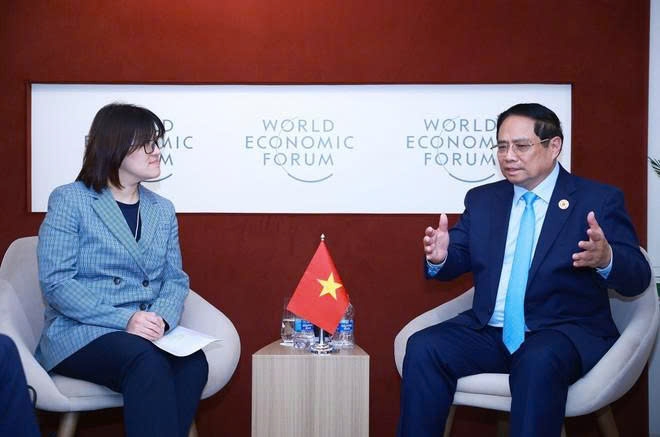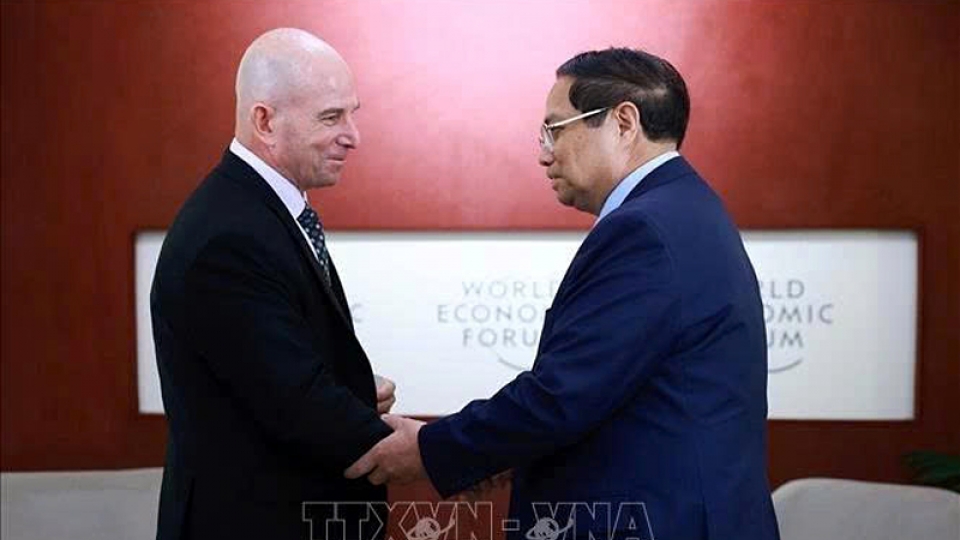PM pushes for infrastructure, food industry growth in talks with global giants
Prime Minister Pham Minh Chinh had meetings with leaders from multinational corporations on June 25, advancing Vietnam’s infrastructure development as well as food processing sector, on the sideslines of the 16th Annual Meeting of the New Champions of the World Economic Forum (WEF) in Tianjin city.

In a key meeting with Peter Körte, a member of the Managing Board, Chief Technology Officer and Chief Strategy Officer at Siemens AG, the PM praised the group’s effective operations across the globe and welcomed its expansion plans in Vietnam, emphasising that infrastructure development represents a "breakthrough" priority for the country's socio-economic development strategy.
Vietnam has identified infrastructure development as a fundamental pillar of national progress, he noted, detailing the country’s approach to infrastructure investment, including public-private partnership models for large-scale national projects spanning transportation, energy, and digital infrastructure.
He highlighted Vietnam’s infrastructure development roadmap, covering road, rail, aviation, and maritime transport, stating recent institutional reforms have created more flexible mechanisms and policies for investors with broader scope and streamlined procedures. He urged Siemens to work closely with competent ministries, sectors, and localities to carry out concrete cooperation projects.
The Vietnamese Government leader welcomed Siemens’ interest in the high-speed rail project in Vietnam, adding the country is expanding railways with China that will link to Central Asia and Europe. He suggested the corporation engage with relevant ministries and Vietnam Railways to explore participation opportunities.
According to Körte, the German technology giant, which generated EUR75.9 billion (over US$88 billion) in revenue in 2024 with some 312,000 employees worldwide, has maintained its presence in Vietnam since 1993. The company currently operates three offices in Hanoi, Da Nang, and Ho Chi Minh City, along with a manufacturing facility in Binh Duong province. He expressed Siemens’ strong interest in participating in Vietnam’s infrastructure projects, particularly the country’s high-speed railway development.

Also on June 25, PM Chinh had a meeting with Anne Tse, CEO Asia Pacific at Pepsico, a leading US-based multinational corporation in food, snacks, and beverages, which has operated in Vietnam for over 31 years. PepsiCo currently runs food and beverage processing plants in the country with a total investment of nearly US$1 billion.
Tse expressed PepsiCo’s interest in not only expanding its food and beverage production in Vietnam but also investing in high-tech agriculture and processing for both domestic consumption and export to regional countries.
PM Chinh congratulated PepsiCo on its success in the globe and Vietnam, particularly its recent projects in Ha Nam and Long An provinces. He praised the company’s practical contributions to Vietnam’s economic development and the Vietnam-US relationship.
Updating Tse on Vietnam’s socio-economic development strategy and its partnership with the US, the PM affirmed Vietnam’s commitment to fostering a favourable investment environment. He highlighted ongoing reforms of Vietnam, including institutional restructuring, apparatus streamlining, and efforts to remove barriers for both domestic and foreign enterprises, including US firms.
The leader noted that while Vietnam has abundant raw agricultural materials, many are seasonal and difficult to preserve. He encouraged PepsiCo to invest in deep processing of Vietnamese agricultural products, helping to elevate them under the Pepsi brand and increase their value, not just for the 100-million-strong domestic market but also for regional and global distribution.
To further advance economic, trade, and investment cooperation in particular and the Vietnam-US ties as a whole, the PM invited PepsiCo to continue expanding its investment in Vietnam. He also called on the company to serve as a bridge to bring more US businesses and PepsiCo partners to the country.
He urged PepsiCo to support Vietnamese farmers and enterprises in boosting production capacity, improving competitiveness, and joining global supply chains. This includes sharing knowledge, expertise, modern solutions, and technologies to help Vietnam restructure its economy and transition toward a green, sustainable growth model.



